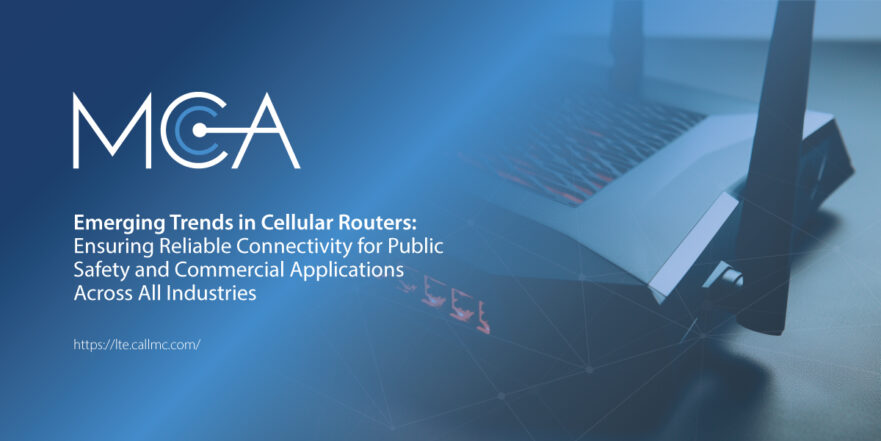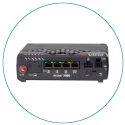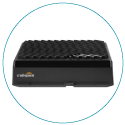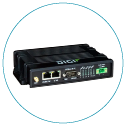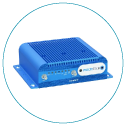Cellular Routing Trends Within Government and Commercial Applications
5G Networking Provides Reliable Connectivity Across All IndustriesThe demand for seamless and reliable internet access has become essential across all industries. At the heart of this connectivity revolution are routers, devices that direct data traffic between different networks, allowing devices to communicate with each other and access the internet. Among the various types of routers, cellular routers have gained prominence due to their ability to provide internet connectivity through cellular networks, such as 4G LTE and the emerging 5G.
Cellular routers differ from traditional wired routers in that they utilize cellular networks to establish internet connectivity, making them ideal for scenarios where wired connections are impractical or impossible. These routers are equipped with SIM cards, much like mobile phones, and can connect to a range of cellular networks, offering flexibility and mobility.
Use Cases for Cellular Routers Across Various Industries
Public Safety
Cellular routers play a crucial role in public safety operations by enabling reliable emergency communication for first responders. They provide connectivity in remote or disaster-stricken areas where traditional networks are unavailable. For example, police vehicles, ambulances, and fire trucks are often equipped with cellular routers to maintain real-time communication with dispatch centers and other emergency services, ensuring timely and coordinated responses.
Transportation and Logistics
In the transportation sector, cellular routers are used in vehicles such as buses, trucks, and trains to provide internet access to passengers and support fleet management operations. These routers enable real-time vehicle tracking, route monitoring, and communication between drivers and dispatchers. In logistics, cellular routers facilitate the management of goods and services by providing connectivity for tracking shipments and optimizing delivery routes.
Retail and Branch Ops
Retail businesses leverage cellular routers for point-of-sale (POS) systems, particularly in pop-up shops, kiosks, and remote locations where wired connections are not feasible. By using cellular routers, retailers can ensure secure transactions and continuous service without relying on fixed internet infrastructure.
Construction
Cellular routers provide essential connectivity for project management on construction sites, enabling real-time communication, remote monitoring, and data sharing. With the help of cellular routers, construction teams can access plans and documents, communicate with remote offices, and use IoT devices for equipment monitoring and site security, all while on the move.
Healthcare
In the healthcare industry, cellular routers enable remote medical services by providing reliable connectivity for telehealth consultations, remote patient monitoring, and mobile clinics. These routers ensure that healthcare providers can offer continuous care and access to critical data, even in rural or underserved areas.
Utilities and Energy
Cellular routers are used in the utilities and energy sectors for remote monitoring and management of infrastructure such as pipelines, wind turbines, and power grids. They allow for data collection from remote sensors, providing real-time insights into system performance and enabling predictive maintenance to prevent failures.
As digitalization continues to transform various industries, the role of cellular routers is expanding. These devices are no longer just tools for connectivity; they are becoming integral to operations, security, and innovation. As the need for robust, secure, and fast connections grows, the technology underlying cellular routers continues to evolve, integrating cutting-edge advancements to meet diverse operational demands.
The Evolution of Cellular Communication Routers
The Rise of 5G Technology
The deployment of 5G technology marks a significant milestone in cellular router evolution. Offering dramatically faster data speeds, lower latency, and higher capacity, 5G transforms cellular routers into powerhouses of efficiency and reliability. This technological leap supports emerging applications such as autonomous vehicles and smart city infrastructure, enhancing operational capabilities in public safety and commercial environments.
Advancements in Security Measures
Cellular routers are the backbone of critical communication networks, and their security is paramount. Modern routers incorporate advanced security protocols like VPN support, end-to-end encryption, and robust firewalls to safeguard sensitive data. Continuous software updates are essential to protect against evolving cyber threats, ensuring that public safety communications and commercial transactions remain secure.
Seamless IoT Integration
The integration of cellular routers with IoT devices has become increasingly prevalent, driven by the expansive growth of IoT technology in various sectors. These routers facilitate stable and reliable connections for many IoT applications, proving indispensable in remote monitoring and control operations, particularly in locations where traditional connectivity options falter.
Incorporating Edge Computing
Cellular routers now boast edge computing capabilities to manage the voluminous data from connected devices efficiently. This innovation allows data processing closer to the source, minimizing latency and reducing reliance on distant data centers. Edge computing proves invaluable in scenarios requiring instantaneous data analysis, such as public safety operations or real-time commercial processing.
Enhanced Connectivity with Dual SIM and Multi-WAN
Connectivity reliability is crucial, especially in applications where downtime can lead to critical losses. Modern cellular routers address this with dual SIM and multi-WAN support, facilitating seamless switching between multiple networks to maintain uninterrupted service. This feature is crucial for emergency services and commercial entities, ensuring consistent connectivity even under challenging conditions.
Integration of Power Over Ethernet (PoE)
Power Over Ethernet technology in cellular routers simplifies the deployment of network equipment by eliminating the need for separate power supplies. This is particularly advantageous in challenging deployment environments, such as public safety and remote commercial locations, where running power can be problematic.
Emphasis on Sustainability
Sustainability has become a guiding principle in the manufacturing and operation of cellular routers. Efforts to minimize energy consumption and utilize recyclable materials reflect a commitment to reducing the ecological footprint of technological advancement. These practices support environmental sustainability and enhance the cost-effectiveness of deploying cellular communication technologies.
The Pivotal Role of Cellular Routers
Cellular routers stand at the vanguard of networking technology, vital for the ongoing expansion of connected services across all sectors. The highlighted trends underscore this field's dynamic nature, where innovation continually drives enhancements in functionality, security, and efficiency. As the digital landscape evolves, cellular routers will increasingly become critical to the infrastructure that underpins our connected world, enabling new applications and supporting existing operations with enhanced efficiency and security. Whether powering the next-generation 5G applications, bridging connections in IoT, or promoting sustainable practices, cellular routers are set to play a central role in the future of digital communication.
About MCA and Our CNS Team
MCA is one of the largest and most trusted integrators in the United States, offering world-class voice, data, and security solutions that enhance the quality, safety, and productivity of customers, operations, and lives. More than 65,000 customers trust MCA to provide carefully researched solutions for a safe, secure, and more efficient workplace.
Our Cellular Networking Solutions (CNS) team (formerly known as USAT) is made up of certified experts in designing and deploying fixed and mobile wireless data connectivity solutions for public and private enterprises nationwide - complete with implementation, training, proof of concept (POC), system auditing, and on-site RF surveying services with optional engineering maintenance contracts.
Our extensive catalog of world-class routers, antennas, and software designed for remote monitoring and management in even the harshest environments allows us to deliver a full suite of reliable technologies capped with a service-first approach.
Share this Post

